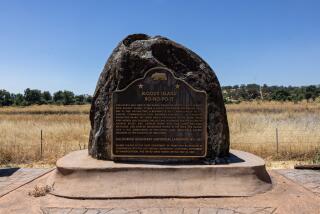City Survives Identity Crisis
- Share via
Cities have been named for early settlers, famous personages, topographical characteristics or a bit o’ whimsy. And happily or not, once the name was chosen, a city simply learned to live with it.
Take for instance the tongue-twister Nagogdoches, Tex., the rambunctious-sounding Wahoo, Neb., the uninspiring Flathead, Mont., or the Southland’s own little Azusa, for “best little town from A to Z in the USA.”
Other cities, however, like Cypress, Calif., deserve special mention for the name-picking anguish they have endured over the decades, probably with unnerving results to the city’s psyche.
Cypress has lived through a seesaw of indecision and discarded names. And to make matters more confusing, there were never any cypresses to inspire its present name.
Several attempts had been made to name the town for its prevalent natural attributes, now long since forgotten.
In 1904, when Pacific Electric Railroad built its line from Los Angeles to Santa Ana, a subdivision of 160 acres was laid out along the right-of-way just east of the Orange County line.
The place was then called Waterville because of the many artesian wells in the area. Later, when Pacific Electric opened a station there, they called it Cypress.
Ah, but the townspeople were still openly fickle in regard to the town’s name.
Caught up in the frenzy of Charles A. Lindbergh’s historic solo flight over the Atlantic in 1927, they thought it proper to honor the American aviator by changing the name of their town to Lindbergh.
That same year, a post office was applied for under the name of Lindbergh, but the citizens rejected their impulsive choice and retained the name chosen by the railway company.
In 1956, the city was briefly called Dairy City, in order to protect its farming interests, but that same year the community resolved to rename their newly incorporated city--Cypress.
By now, it seemed appropriate to plant a few cypress trees.
Today, a burgeoning industrial growth seems to be taking over the former cow pastures and strawberry fields, but the community is bearing well and prosperously with the new wind that blows.
Perhaps the cypress, with its traditional symbolism of immortality and its inherent adaptability, may be the best name for the city, after all.
More to Read
Sign up for Essential California
The most important California stories and recommendations in your inbox every morning.
You may occasionally receive promotional content from the Los Angeles Times.













